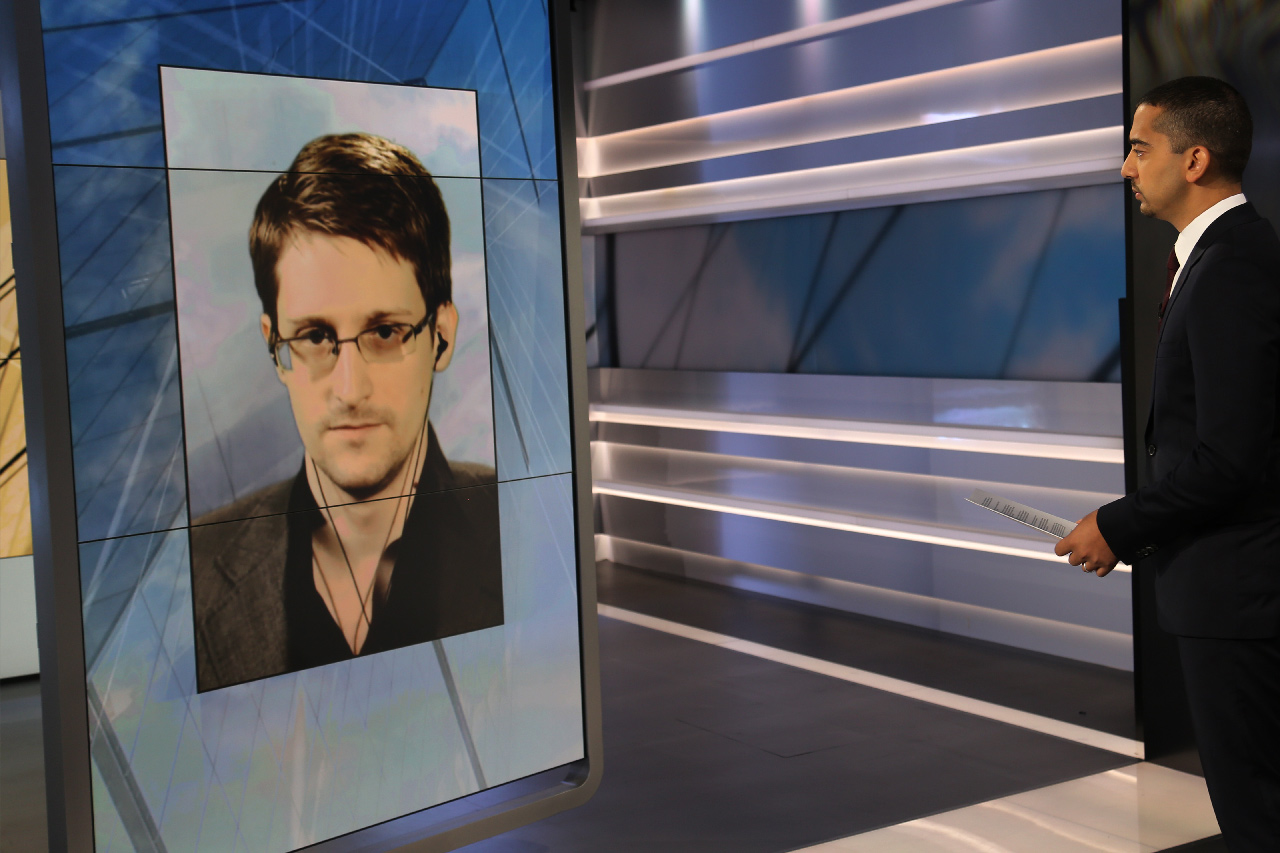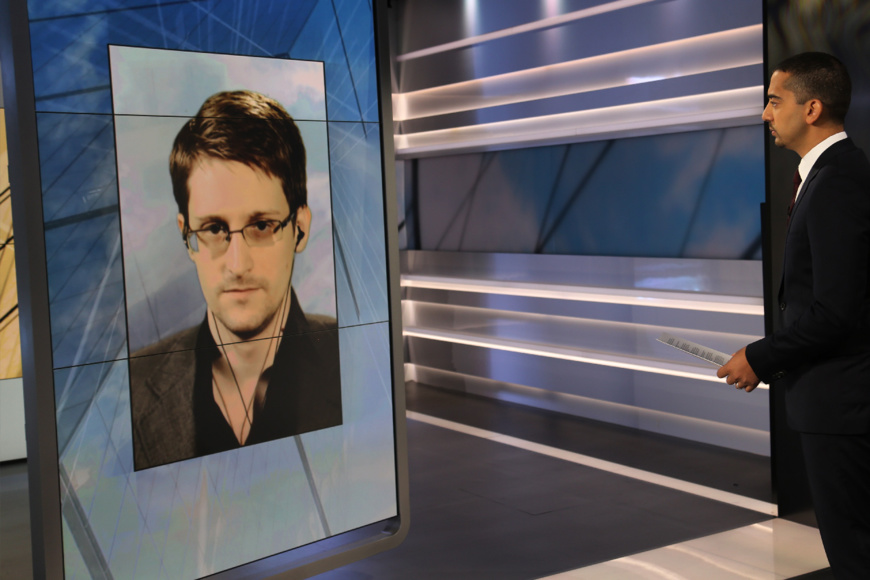Washington D.C. – 3 September, 2015 – In a rare and exclusive Al Jazeera television interview, former NSA contractor-turned-whistleblower Edward Snowden has responded to a number of his high profile critics, including Hillary Clinton and Donald Trump, and commented on the recent appeal court ruling on NSA surveillance.
Appearing on Al Jazeera English’s new show UpFront, which launches globally on 4 September, and asked to comment on the ongoing controversy surrounding Hillary Clinton’s emails, Snowden said, “This is a problem because anyone who has the clearances that the Secretary of State has, or the director of any top level agency has, knows how classified information should be handled.”
“If an ordinary worker at the State Department or the Central Intelligence Agency […] were sending details about the security of embassies which is alleged to be in her email, meetings with private government officials, foreign government officials and the statements that were made to them in confidence over unclassified email systems, they would not only lose their jobs and lose their clearance, they would very likely face prosecution for it.”
Snowden added: “When the unclassified systems of the United States government, which has a full time information security staff, regularly gets hacked, the idea that someone keeping a private server in the renovated bathroom of a server farm in Colorado, is more secure is completely ridiculous.”
Asked about Donald Trump, who called Snowden a “total traitor” and had also suggested having him executed, Snowden laughed and responded, “It’s very difficult to respond in a serious way to any statement that’s made by Donald Trump.”
Joining the first edition of UpFront from Moscow, Snowden argued: “When you’ve got Donald Trump and John Kerry on one hand and people like [Wikipedia’s] Jimmy Wales who are improving the world on the other hand, I think it’s obvious which side that most people would rather be on.”
Snowden also commented on last week’s US appeal court ruling about the NSA, saying “the issue that we’re seeing in the courts, and this is an ongoing thing for the last 50 years, is that courts won’t tell you whether or not a program is lawful or unlawful until you can prove that it actually exists.”
“When the government denies that these programs exist, the only way we can ever get a hearing on whether they’re lawful or unlawful […] is if we have whistleblowers come forward and reveal actual classified evidence which allows the courts to say under their own rules this is a real program.”
Addressing his much-discussed “exile” in Moscow, Snowden defended his controversial decision in 2013 to publicly praise a group of countries, including Russia, for standing against “human rights violations” and earning “the respect of the world.”
He told host Mehdi Hasan that he “wasn’t talking about the [Russian] government specifically. I was talking about the nation, the nation as a people,” adding: “I’ve been extremely critical of Russia’s human rights records, particularly as it relates to the internet, because we’ve seen a growing amount of censorship, a growing amount of critical, controlling, bad and honestly completely unnecessary laws.”
When asked by Hasan if Russian president Vladimir Putin was an authoritarian leader, Snowden conceded, “I don’t think anybody would question the assertion that he’s an authoritarian leader. That’s sort of his brand.”
Questioned as to whether he really believed the Obama administration would have journalists such as Glenn Greenwald or the Washington Post’s Barton Gellman killed for reporting on NSA leaks, as Snowden previously suggested in a 2014 interview with the Guardian, the former NSA contractor replied: “Certainly not in a way that would not be deniable.” Obama, Snowden noted, “has already authorized the extrajudicial killing of a United States citizen far from any battlefield.”
He continued: “I’m not going as far as to say they would be killed, I do think that’s a little bit too far, but the bottom line is you have to prepare journalists who have never worked in intelligence […] how seriously to take the reporting process.”
Snowden also referred to former Obama attorney general Eric Holder’s recent claim that there was still time for a plea deal and a US return as a “significant concession,” saying he would be willing to leave Moscow and head home if he was guaranteed a “fair trial” and the possibility of a “public interest defence.”
“People recognize that the sort of show trial, which is what’s on the table right now, is not in the interest of the public,” he added. “It’s not the interest of the government; it’s not in anyone’s interest, including my own….”
UpFront will be broadcast from Al Jazeera’s brand new studios in Washington DC Fridays at 19.30 GMT. Taking on Hasan’s successful and rigorous style of interviewing, showcased on Al Jazeera’s one-on-one interview series Head to Head, UpFront will ask the questions that often get left behind. All episodes will be available online at: www.aljazeera.com/upfront. · Follow UpFront on Twitter @AJUpFront.
Appearing on Al Jazeera English’s new show UpFront, which launches globally on 4 September, and asked to comment on the ongoing controversy surrounding Hillary Clinton’s emails, Snowden said, “This is a problem because anyone who has the clearances that the Secretary of State has, or the director of any top level agency has, knows how classified information should be handled.”
“If an ordinary worker at the State Department or the Central Intelligence Agency […] were sending details about the security of embassies which is alleged to be in her email, meetings with private government officials, foreign government officials and the statements that were made to them in confidence over unclassified email systems, they would not only lose their jobs and lose their clearance, they would very likely face prosecution for it.”
Snowden added: “When the unclassified systems of the United States government, which has a full time information security staff, regularly gets hacked, the idea that someone keeping a private server in the renovated bathroom of a server farm in Colorado, is more secure is completely ridiculous.”
Asked about Donald Trump, who called Snowden a “total traitor” and had also suggested having him executed, Snowden laughed and responded, “It’s very difficult to respond in a serious way to any statement that’s made by Donald Trump.”
Joining the first edition of UpFront from Moscow, Snowden argued: “When you’ve got Donald Trump and John Kerry on one hand and people like [Wikipedia’s] Jimmy Wales who are improving the world on the other hand, I think it’s obvious which side that most people would rather be on.”
Snowden also commented on last week’s US appeal court ruling about the NSA, saying “the issue that we’re seeing in the courts, and this is an ongoing thing for the last 50 years, is that courts won’t tell you whether or not a program is lawful or unlawful until you can prove that it actually exists.”
“When the government denies that these programs exist, the only way we can ever get a hearing on whether they’re lawful or unlawful […] is if we have whistleblowers come forward and reveal actual classified evidence which allows the courts to say under their own rules this is a real program.”
Addressing his much-discussed “exile” in Moscow, Snowden defended his controversial decision in 2013 to publicly praise a group of countries, including Russia, for standing against “human rights violations” and earning “the respect of the world.”
He told host Mehdi Hasan that he “wasn’t talking about the [Russian] government specifically. I was talking about the nation, the nation as a people,” adding: “I’ve been extremely critical of Russia’s human rights records, particularly as it relates to the internet, because we’ve seen a growing amount of censorship, a growing amount of critical, controlling, bad and honestly completely unnecessary laws.”
When asked by Hasan if Russian president Vladimir Putin was an authoritarian leader, Snowden conceded, “I don’t think anybody would question the assertion that he’s an authoritarian leader. That’s sort of his brand.”
Questioned as to whether he really believed the Obama administration would have journalists such as Glenn Greenwald or the Washington Post’s Barton Gellman killed for reporting on NSA leaks, as Snowden previously suggested in a 2014 interview with the Guardian, the former NSA contractor replied: “Certainly not in a way that would not be deniable.” Obama, Snowden noted, “has already authorized the extrajudicial killing of a United States citizen far from any battlefield.”
He continued: “I’m not going as far as to say they would be killed, I do think that’s a little bit too far, but the bottom line is you have to prepare journalists who have never worked in intelligence […] how seriously to take the reporting process.”
Snowden also referred to former Obama attorney general Eric Holder’s recent claim that there was still time for a plea deal and a US return as a “significant concession,” saying he would be willing to leave Moscow and head home if he was guaranteed a “fair trial” and the possibility of a “public interest defence.”
“People recognize that the sort of show trial, which is what’s on the table right now, is not in the interest of the public,” he added. “It’s not the interest of the government; it’s not in anyone’s interest, including my own….”
UpFront will be broadcast from Al Jazeera’s brand new studios in Washington DC Fridays at 19.30 GMT. Taking on Hasan’s successful and rigorous style of interviewing, showcased on Al Jazeera’s one-on-one interview series Head to Head, UpFront will ask the questions that often get left behind. All episodes will be available online at: www.aljazeera.com/upfront. · Follow UpFront on Twitter @AJUpFront.
 Menu
Menu
 Exclusive interview with Edward Snowden on UpFront on Al Jazeera English
Exclusive interview with Edward Snowden on UpFront on Al Jazeera English

















